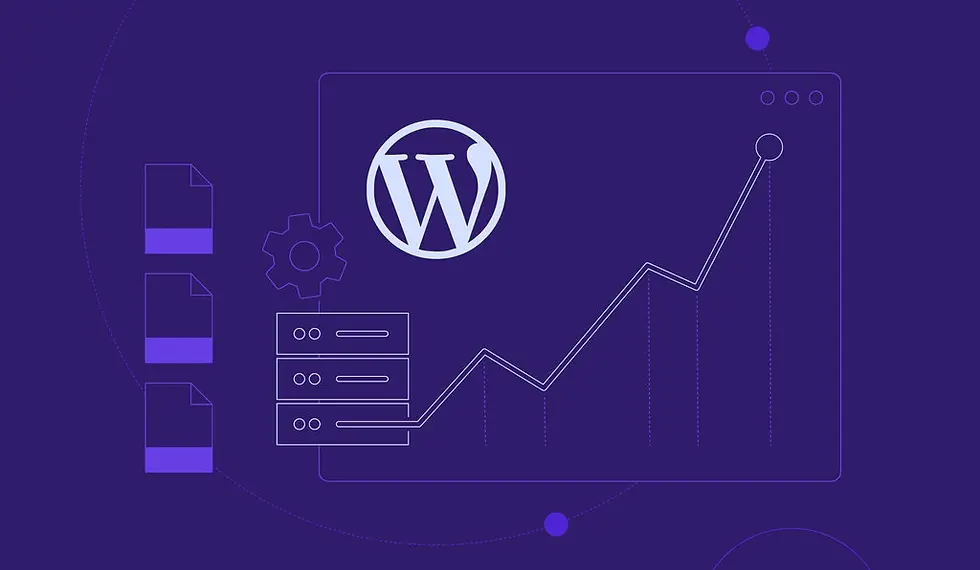How to Optimize WordPress for Speed: A Developer’s Guide
- Muhammad Hassan
- Mar 6, 2025
- 4 min read

WordPress is a powerful platform, but without proper optimization, your site can become slow, negatively affecting user experience and search rankings. As a developer, ensuring your WordPress site runs efficiently requires a combination of best practices, plugins, and performance tweaks. If you want to streamline the process, you can hire WordPress developers who specialize in optimizing speed and performance. This guide will walk you through key strategies to speed up your WordPress website effectively.
1. Choose a Fast and Reliable Hosting Provider
Your hosting provider plays a crucial role in site speed. Opt for a reliable host that offers high-performance servers, preferably with SSD storage and built-in caching. Managed WordPress hosting services can also optimize performance by handling updates and security efficiently.
2. Use a Lightweight WordPress Theme

A bloated theme with excessive features can slow down your site. Instead, choose a lightweight and well-coded theme that prioritizes speed. Frameworks like Astra, GeneratePress, or the default WordPress themes are optimized for performance.
3. Optimize Images for Faster Loading
Large images can slow down your website. Use image compression tools like TinyPNG, ShortPixel, or WP Smush to reduce file sizes without compromising quality. Additionally, enable lazy loading to defer offscreen images until they are needed.
4. Enable Caching for Faster Load Times

Caching stores static versions of your pages, reducing the need for repeated database queries. Use caching plugins like WP Rocket, W3 Total Cache, or WP Super Cache to improve performance significantly.
5. Minify and Combine CSS & JavaScript Files
Reducing the number of HTTP requests speeds up loading times. Use tools like Autoptimize or WP Rocket to minify and combine CSS and JavaScript files. Additionally, consider loading JavaScript asynchronously to prevent render-blocking.
6. Optimize Your WordPress Database

Over time, your WordPress database accumulates unnecessary data, slowing down queries. Regularly optimize your database using plugins like WP-Optimize or Advanced Database Cleaner to remove post revisions, spam comments, and transient options.
7. Implement a Content Delivery Network (CDN)
A CDN distributes your website's assets across multiple servers worldwide, reducing load times for users in different locations. Popular CDN services include Cloudflare, KeyCDN, and StackPath.
8. Reduce the Number of Installed Plugins

Excessive plugins can slow down your site. Audit your plugin list and remove any that are unnecessary or poorly coded. Always use well-maintained plugins from reputable developers.
9. Enable Gzip Compression
Gzip compression reduces file sizes before they are sent to the browser, decreasing load times. You can enable Gzip compression through your hosting provider or by using a plugin like WP Rocket.
10. Optimize WordPress for Mobile Performance

Mobile users expect fast-loading websites. Use responsive themes, compress images, and enable AMP (Accelerated Mobile Pages) for a smoother mobile experience. Google’s PageSpeed Insights can help you identify mobile-specific performance issues.
11. Utilize Lazy Loading for Better Performance
Lazy loading delays the loading of images and videos until they are needed. This technique can significantly improve page speed. Plugins like a3 Lazy Load and WP Rocket offer easy lazy loading implementation.
12. Regularly Update WordPress, Themes, and Plugins

Keeping WordPress core, themes, and plugins updated ensures optimal performance and security. Outdated software can slow down your site and pose security risks.
13. Optimize Web Fonts and Icons
Using multiple web fonts or large icon libraries can impact load times. Stick to system fonts where possible, and use font-display: swap; to ensure text remains visible during font loading.
14. Disable Unnecessary WordPress Features

WordPress includes various built-in features that may not be needed. Disable features like emojis, embeds, and heartbeat API if they are not essential. Plugins like Perfmatters can help disable these options easily.
15. Use a Dedicated Development Team for Optimization
For complex projects, consider working with professionals who specialize in WordPress optimization. When you hire WordPress developers, you gain expertise in performance tuning, security enhancements, and custom solutions tailored to your site’s needs.
16. Consider Alternative Platforms for High-Performance eCommerce
If you are running an eCommerce store and need a high-performance solution, exploring alternative platforms like Magento may be beneficial. Many businesses hire Magento developers to build scalable and optimized eCommerce sites that can handle large traffic volumes efficiently.
Conclusion
Optimizing WordPress for speed is essential for delivering a seamless user experience and improving SEO rankings. By implementing the above strategies, you can enhance performance and ensure your website remains competitive. Whether it’s leveraging caching, minimizing HTTP requests, or working with experts to hire WordPress developers, investing in optimization will yield significant long-term benefits. By focusing on continuous improvements and monitoring site performance, you can maintain a fast and efficient WordPress website that enhances user engagement and boosts conversions.
FAQs
1. Why is WordPress speed optimization important?
A slow website leads to poor user experience, higher bounce rates, and lower search engine rankings. Speed optimization ensures better performance, improved SEO, and higher conversions.
2. What is the best hosting provider for WordPress speed?
Managed WordPress hosting providers like Kinsta, WP Engine, and SiteGround offer optimized environments with caching and performance enhancements.
3. How does a CDN improve WordPress speed?
A CDN caches your website’s static files on multiple servers worldwide, reducing latency and improving load times for users across different locations.
4. What are the best plugins for optimizing WordPress speed?
Popular plugins include WP Rocket, W3 Total Cache, Autoptimize, and WP Smush for caching, minification, and image optimization.
5. How can I check my WordPress website speed?
Use tools like Google PageSpeed Insights, GTmetrix, and Pingdom to analyze and improve your website’s loading times.
6. How often should I optimize my WordPress database?
Regular database optimization, at least once a month, helps remove unnecessary data and improve website performance.
7. Can hiring professionals help in WordPress optimization?
Yes, when you hire WordPress developers, they bring expertise in fine-tuning performance, implementing best practices, and ensuring long-term speed optimization.





Comments